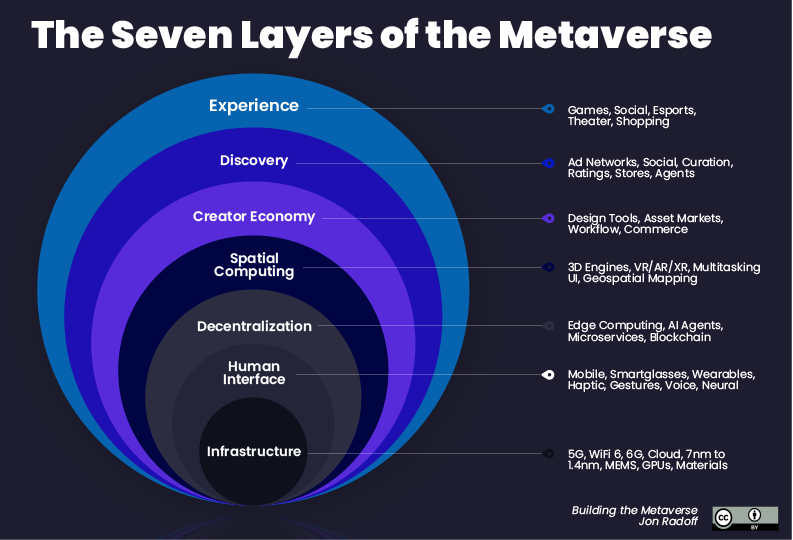It's been a while since Metaverse has stolen the hot seat in the digital world. But for a vivid novel reader, this was around way back. Stephenson coined Metaverse in his novel Snow Crash during 1992. It depicts his vision of how a virtual reality-based Internet might evolve in the future. Well, it looks like he has time-traveled, and now it's not fiction anymore.
We live in a world that is different each year, and it has gone more from envisioning to experiencing everything in detail.
The Metaverse Realm
The Internet has drastically changed how we are sharing what we have. Back in the 1980s, it was nothing more than a communication medium. Time flew, and things have changed, from being a network of computers, the Internet is the soul of your daily life. Tweets, shares, comments, emails, meetings; the Internet is your daily bread.
Imagine a world with billions of people, not far away from you. People roaming, working, and enjoying and you are on the couch experiencing the buzz. Everything will be replicated virtually and connected. Metaverse is the virtual world, holding all the assets and processes related to the physical world.
Meta+Universe -> Metaverse, which states a self-reflective universe. The literal meaning is not a point of discussion, Metaverse is a virtual world for a few, but some believe it's ground for you and your friends. Well, the business world is thinking of it as the next-level commercial space for customers.
From a technical standpoint, Metaverse is the convergence of cryptocurrency, artificial intelligence (AI), augmented reality (AR) and virtual reality (VR), spatial computing, and more. Metaverse is not one specific type of technology, it's not your smartphone application running on top of a service.
The celebrities - AR & VR
20-20s have seen the cusp of a tech revolution, and the two pillars of the metaverse, Augmented reality and virtual reality were vital in budding the metaverse. These two have scaled the immersive technology from an observation slant that prevailed with the flat TVs.
Augmented Reality [ AR ]

AR offers a replacement for flat vision and delivers a real-time experience in front of you. AR is the combination of real-world and computer-generated content. The main benefit of augmented reality lies in its ability to seamlessly integrate digital elements into a user's perception of the physical world. This goes beyond simply displaying data and instead provides an immersive experience that feels like a natural extension of the user's surroundings.
Virtual Reality [ VR ]

VR on the other hand is for your curious mindset and provides a virtual experience. VR simulates an interactable environment, that leverages pose tracking alongside 3D near-eye displays, to deliver an engaging feel of a virtual world. VR is capable of envisioning the areas that are traditionally obscure to reach. While AR enhances real-world views, VR technology assembles the human senses and creates a synthetic environment.
Building the Metaverse
Building Metaverse is far-fetched without Web3. The web has evolved from 1.0 to 3.0, and the transition alongside blockchain and cryptocurrency has pushed the limits of Web3. Web3 incorporates concepts such as decentralization, blockchain technologies, and token-based economics.
Metaverse Rainbow: 7 Layers
The community has driven the Metaverse to become the most celebrated outcome of the Web3 ecosystem. The complexity of Web3 technology is on par with Metaverse as well. Abiding in the ecosystem requires seven integral layers, that tailor the entire Metaverse realm.

Developing metaverse on top of the stated layers is not a cushy job. Finally, it should mimic the physical world with a pack of technologies. Each layer works together, to produce multimodal interactions and allow people to connect from everywhere.
The value chain market of the metaverse requires these seven layers, and it has a downside as well. As of now, the metaverse is in a nascent stage —it’s not exactly a good thing or a bad thing. Metaverse resides on a scale that can be either beneficial or detrimental to those who participate in it.
Challenges
Given that it's a grey area, it creates new challenges. The trustworthy is straightforward when it comes to the real world. But in the virtual world, what makes up one’s identity? How to prove that you are who you are, instead of another person or even a bot trying to mimic your existence? Building trust in the design is an undeniable fact. It should be mature enough to hold the data, verify the ownership and ultimately an established jurisdiction - everyone wants to play safe.
Challenges are not limited, a real-time experience mandates low latency in the connectivity, and hardware for getting into this world, it's not an application running on top of a service. Metaverse is the new buzzzzz.
The metaverse buzzzzzz.....
Everyone is after Metaverse, Facebook came into play by rebranding to Meta, with a great focus on Metaverse. But Meta is not the only one with a plan. Roblox, Microsoft, Unity, Tencent and the list is going big, every other tech company has assembled a big chunk of their workforce for active developments. As per Bloomberg, the metaverse market might hit 783$ billion in 2024.

With the continuous progress in various industries, previously inconceivable concepts from science fiction and fantasy literature are slowly transforming into tangible reality. As the metaverse progresses, we catch a glimpse of a more diverse and limitless world that offers excellent potential!
